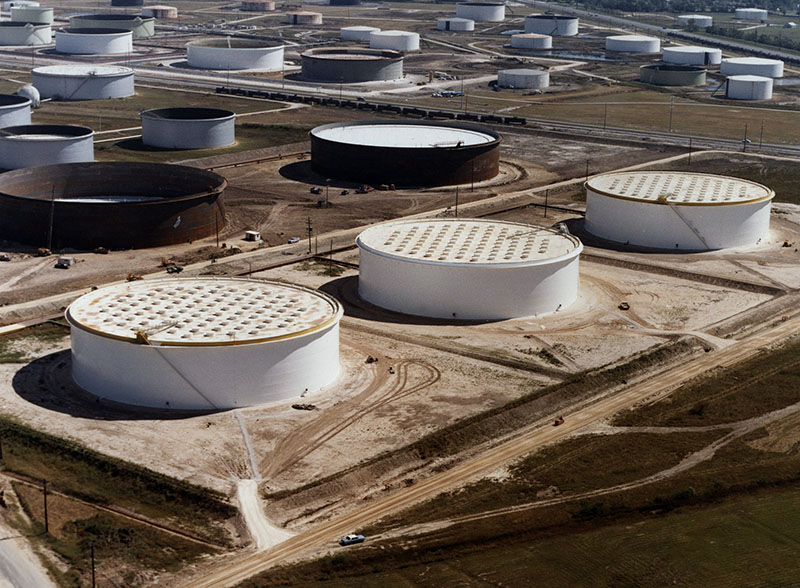(Bloomberg) — Oil dropped below $50 in New York for the first time since December as concerns that OPEC’s output cuts are failing to rein in record U.S. stockpiles triggered the biggest slump in more than a year.
West Texas Intermediate fell as much as 3% after losing 5.7% the previous three sessions. Crude supplies rose 8.2 million to the highest level in weekly government data since 1982. Harold Hamm, the U.S. shale oil billionaire, warned on Wednesday that the industry could “kill” the market if it embarks on another spending binge. The market swoon stoked the second-highest WTI options trading volume ever and sent volatility surging.
Oil had fluctuated above $50 a barrel since the Organization of Petroleum Exporting Countries and other countries started trimming supply for six months starting Jan. 1 to reduce a global glut. While U.S. shale output has rebounded, larger-than-expected cuts elsewhere and signs of growing demand suggest stockpiles will eventually decline, according to Goldman Sachs Group Inc.
"People are nervous about the global supply-demand balance," Adam Sieminski, a scholar at the Center for Strategic and International Studies in Washington and former head of the Energy Information Administration, said by telephone. "Shale is coming back with $50 oil and there’s uncertainty about whether OPEC and its partners are going to roll-over the production agreement."
West Texas Intermediate for April delivery dropped $1.15, or 2.3%, to $49.13 a barrel at 11:09 a.m. on the New York Mercantile Exchange. Futures touched $48.79, the lowest since Nov. 30 . Total volume traded was more than double the 100-day average. The contract fell 5.4% to $50.28 on Wednesday, the biggest decline since February 2016.
Huge Spike
Brent for May settlement slipped $1.06 to $52.05 a barrel on the London-based ICE Futures Europe exchange. Prices fell to $51.60, the lowest since Dec. 1. The global benchmark crude traded at a $2.37 premium to May WTI.
WTI options volume jumped to 518,604 Wednesday. Oil market volatility, as measured by the CBOE Crude Oil Volatility Index, rose to a six-week high.
"We’re seeing a huge spike in demand for options on the move below $50 for WTI," Clayton Rogers, an energy derivative broker at SCS Commodities Corp. in Jersey City, New Jersey, said by telephone.
Saudi Arabia’s oil minister Khalid Al-Falih said this week global inventories are falling slower than expected, opening the door to extend the output-cut deal beyond its initial six months. Producers will meet in Vienna in May to decide on the next steps.
"I think there will be a rollover of the agreement, but I don’t think the Saudis are going to rollover to Russia, Iran and Iraq," Sieminski said. "We will have to see compliance from them."
Saudi Arabia put a price to continue its new-found cooperation with Russia and other oil producers. While Al-Falih didn’t rule out extending the duration of the supply cuts, he insisted the kingdom wouldn’t act alone.
“The bottom line here is you have wide compliance within OPEC with the production cuts and on the other hand you have increased production out of the U.S.,” Hans Goetti, chief strategist for the Middle East and Asia at Banque Internationale a Luxembourg, said in a Bloomberg television interview. “The shale oil industry in the U.S. has made great strides to cut costs.”
U.S. crude production increased for a third week to 9.09 million barrels a day, the EIA said Wednesday. The nation’s output is projected to surge to a record 9.73 million barrels a day next year, according to the EIA’s monthly Short-Term Energy Outlook on Tuesday.
Crude stockpiles at Cushing, Oklahoma, the delivery point for WTI and the biggest U.S. oil-storage hub, rose a second week to 64.4 million barrels, the EIA reported.
"The market was very hopeful abut what OPEC was doing and that we were going to see inventories decline as a result," Jacques Rousseau, a managing director of the Washington-based research firm ClearView Energy Partners, said by telephone. "The numbers from the EIA were pretty brutal."
Oil-market news:
Production from Libya’s Waha Oil Co., a venture between the nation’s state oil company and foreign partners, may be suspended as clashes in the country’s east keep the main export terminals out of service. Royal Dutch Shell Plc will sell almost all its production assets in Canada’s oil sands in a $7.25 billion deal that cuts debt and reduces involvement in one of the most environmentally damaging forms of fossil-fuel extraction. Iraq’s oil exports fell 50,658 barrels a day to 3.27 million barrels a day in February, according to a statement from the Oil Ministry.
Bloomberg News by Mark Shenk




